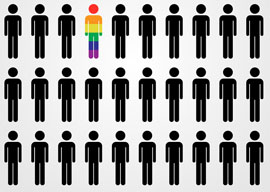
February 04, 2017

Source: Bigstock
In the BMA’s brave new world, no one is a woman, there are only people who identify as women. Likewise, one must not say of someone that she is biologically a woman, but rather that she was assigned as a woman, or rather as a female (according to the guidance, the word girl should also be avoided as demeaning), at birth. The process of assignment, of course, has been purely arbitrary over the past millennia, and has had nothing whatever to do with biology. What a relief to belong to the first enlightened generation in the history of mankind”oops, sorry, humanity.
Come to think of it, humanity is wrong also, containing within it as it does the syllable man. How about hupersonity then, as a sexually neutral”sorry, another mistake, I should have said gender-neutral, for as the booklet tells us, we should endeavor to “move away from the sensitive sexual word””collective term for featherless bipeds? But it is no better, for it implies that everyone is a son, namely the son of Per (which must, etymologically, have been another name for Adam). I suggest, therefore, the word huperoffspringity as a really correct collective noun; though, given that Per was another name for Adam, who was assigned a male at birth and identified as a man, perhaps the syllable should be left out altogether.
No words of mine can do justice to the wealth of absurdity that the framers of this booklet have managed to pack into fourteen pages, which has come in for well-merited mockery around the world. It abolishes biology altogether in favor of a kind of Promethean self-identification: If I say that I identify as a slug or a bird, though I was assigned as a huperoffspring at birth, then I am a slug or a bird.
For fear of being ageist, the booklet says, we should not associate age with abilities. There is no reason to assume that a football team composed of 90-year-olds should not be able to take on Real Madrid or Manchester United. The Book of Proverbs tells us that “To every thing there is a season, and a time to every purpose under the heaven,” but, as Sganarelle tells Géronte in Le Médecin malgré lui, we have changed all that, and now we practice medicine in an altogether new way”and not only medicine, but life itself. The booklet tells us that we should not refer to children under the age of 1; so that from now on we shall have to forgo one of the most useful measures of the health of a population, used for a couple of centuries, the infant mortality rate (the number per thousand of children born alive who die before the age of 1).
The booklet speaks of our values, as if we all have precisely the same values. “Starting from absolute freedom,” said Shigalev in The Devils, “I arrive at absolute despotism.” Of the BMA booklet, one might say that, starting from absolute diversity, it arrives at absolute uniformity.